GE2025: Singapore Democratic Party launches manifesto, calls for changes to economic, healthcare and housing policies
SDP also proposed that the Primary School Leaving Examination (PSLE) be scrapped.
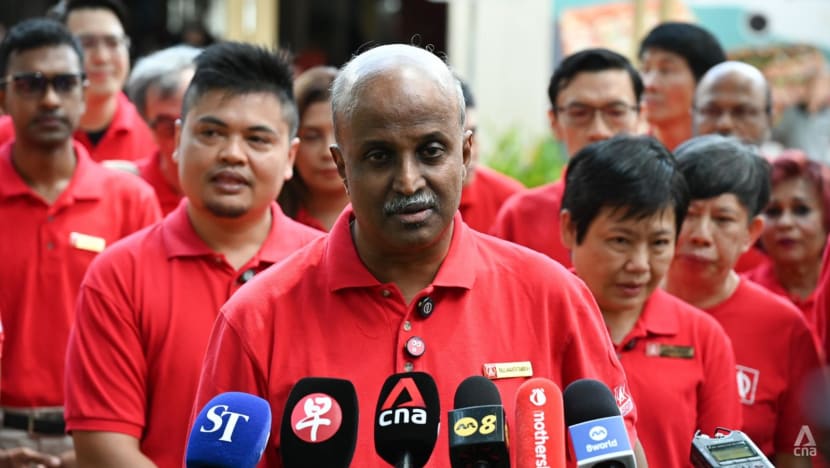
SDP chairman Paul Tambyah launching the party's manifesto at Yew Tee Square on Apr 20, 2025. (Photo: CNA/Syamil Sapari)

This audio is generated by an AI tool.
SINGAPORE: The Singapore Democratic Party (SDP) launched its manifesto on Sunday (Apr 20), unveiling policies around cost of living, healthcare, housing, education and immigration.
In launching its slogan “Thrive, Not Just Survive" on Saturday, the party called for Goods and Services Tax (GST) to be scrapped for everyday essentials and for medical costs to be lowered, among other proposals.
Its manifesto, launched on Sunday, is split into six sections: economy, healthcare, housing, education, immigration and climate change.
One of its proposals is for the creation of a "simple national health insurance system" that eliminates the "complexities" of MediSave, MediShield, and CareShield.
Party chairman Paul Tambyah launched the manifesto on Sunday, alongside vice chairman Bryan Lim, and Marsiling-Yew Tee Group Representation Constituency (GRC) candidates Jufri Salim and Gigene Wong.
Speaking to reporters at Yew Tee Square, Professor Tambyah said: "The campaign manifesto is a promise, it's a promise that we want you all to hold us accountable to."
He added that the party has been "consistent" in what it has been saying for the last 20 to 30 years, and that it has updated its policies by focusing on what various government bodies could have done.
These are the key policies in SDP's manifesto:
ECONOMY
The SDP reiterated its call to reduce GST and to eliminate it for essentials, such as food and medicines.
Prof Tambyah said the party has long called for a decrease in the GST, which currently stands at 9 per cent after an increase last year.
The GST was introduced in 1994 at 3 per cent. This increased to 4 per cent in 2003, 5 per cent in 2004, 7 per cent in 2007, 8 per cent in 2023 and 9 per cent last year.
"What we cannot believe is, in a time of global inflation, that the PAP (People's Action Party) has chosen to raise the GST from 7 per cent to 9 per cent," he said, adding that "at the very least" it should be brought back down to 7 per cent.
He said that if elected, SDP Members of Parliament would ask why there was a S$6.4 billion (US$4.9 billion) surplus for the 2024 financial year – which was revised from the original estimate of S$778 million – and whether there could be a "more equitable way" of distributing revenue generation and reducing GST.
The reduction of GST was also a consistent theme in other opposition parties' manifestos, Prof Tambyah said.
SDP also proposed reducing rents, saying that it is "well within the ability of the government" as it owns most of the land in Singapore.
It added that the government's current approach of handouts and vouchers provides "temporary relief and a cushion at best".
The SDP also asked the government to consider legislating a national minimum wage. It said that while the Progressive Wage Model is a "good start", it does not "recognise the realities on the ground".
"Perpetual training is often not possible for some professions, and not all workers are covered," it added.
When workers lose their jobs, retrenchment insurance – paid out of an individual's Central Provident Fund (CPF) account - should be introduced to provide them with support while they look for new jobs, said the party.
The government recently introduced a Jobseeker Support Scheme, but SDP said it was "extremely complex and limited in the support provided".
"Our proposal goes one step further than the diminishing support by providing genuine relief while being sustainable as it does not tap ... the reserves but rather builds up a pool from workers' CPF contributions," it said.
SDP also suggested divesting inefficient government-linked companies that it said are "slowing down" the growth of small- and medium-sized enterprises, while "weaning our economy of its addiction to multinational corporations".
The opposition party said state investment firm Temasek "should be eliminated" and GIC's operations and accounts made transparent.
On helping the elderly, SDP said it "recognises the value" of the Silver Support Scheme, but wants a "much broader scheme" that assists 80 per cent of low-income elderly with S$500 a month to supplement their CPF.
It said this could be funded "out of a very small portion" of the interest income on investment of the reserves.
SDP also said the CPF minimum sum scheme should be abolished, as it is "not only impractical but also immoral", and that people should be able to choose if they want to keep their money in their accounts to gather interest.
HEALTHCARE
The party proposed that maternal and paediatric services should be "largely free" and funded by the government from taxes. This would reduce the cost of having and bringing up children and "potentially address" the problem of falling birth rates, it added.
Prof Tambyah, who is a senior consultant in the infectious diseases division at the National University Hospital, said the party sees maternal and paediatric care as an investment in the future of the country.
Primary healthcare services for chronic illnesses should also be paid through a "risk pooling system", so that the costs of running these systems are shared by all in the community, said SDP.
The party added that the running costs of hospitals must be paid from taxes, and said the creation of healthcare clusters - the National Healthcare Group, the National University Health System, and Singhealth - has resulted in "significant" wastage and duplication, with multiple CEOs and administrators.
It said this system "needs to be abandoned" and called for Singapore to return to a "single unified public healthcare sector".
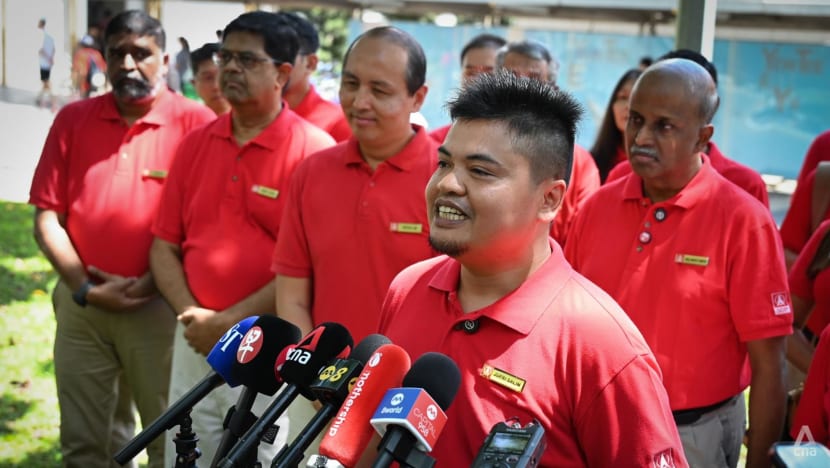
Prof Tambyah said the costs have spiralled "completely out of control" in the private sector and that something needs to be done to "rein in healthcare inflation".
SDP called for hospice care and home care to also be funded by taxes and donations, instead of being dependent on charity.
In funding these systems, the party called for a "single-payer universal healthcare system", in which the government manages a central healthcare fund.
This fund will be run along the lines of a government-subsidised public insurance scheme to finance compulsory basic health, accident and pregnancy coverage for all citizens and permanent residents residing here for more than six months a year.
"No one should risk bankruptcy while seeking life-saving medical treatment," said the party.
HOUSING
Under SDP’s housing policy, the party reiterated its proposal for a Non-Open Market (NOM) scheme for Housing and Development Board (HDB) flats. The central idea behind the NOM scheme is to exclude land cost from HDB flat prices.
According to SDP’s proposal, NOM flats would be built on specially zoned land and can only be sold back to HDB at the purchase price minus lease consumption.
Under the scheme, prices for HDB flats with 99-year leases would range between S$90,000 for a two-room flat to S$270,000 for a 5-room flat. Studio apartments with 30-year leases would cost about S$40,000.
HDB should also hold a buffer stock of flats to enable Singaporeans to obtain their flats with minimal waiting times, said SDP.
Current owners of open market flats would also have the option of converting to the NOM scheme.
Aside from the NOM scheme, the party also proposed a Young Families Priority Scheme to grant balloting priority for couples who are expecting, or first-timer families with children, for Balance or Build-to-Order (BTO) flats in non-mature estates.
It also proposed improved rental support for single-parent and low-income families and an enhanced Lease Buy-Back Scheme for senior citizens.
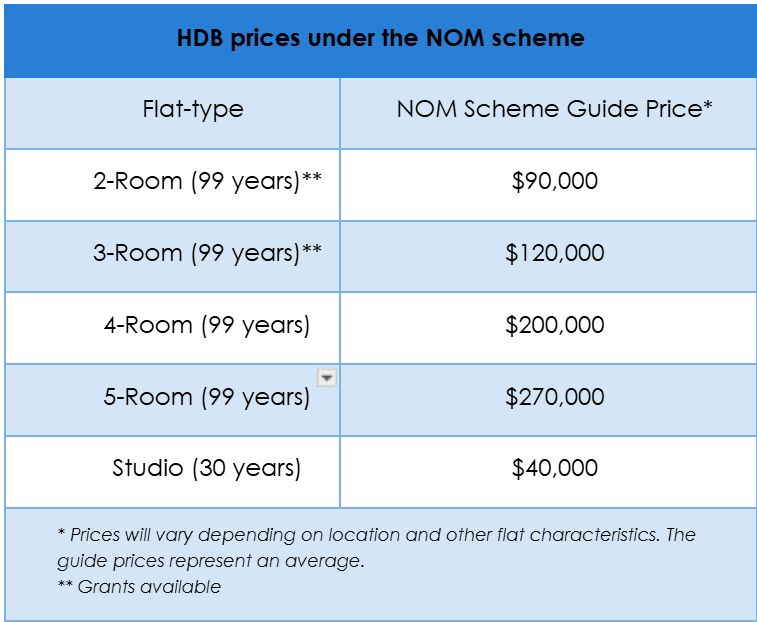
Prof Tambyah also called for the government to provide updates on the Voluntary Early Redevelopment Scheme (VERS), which was first mentioned during the 2018 National Day Rally. With little information on VERS, it makes it "really difficult" for older residents to plan for the future, he said.
SDP chief Chee Soon Juan questioned how many more BTOs are going to be built “before you come to a point where things just don’t work anymore".
Dr Chee said that apart from environmental degradation and climate change, mental health issues can arise when “all the flats are squeezed so tightly”, like what he had noticed in Sembawang West GRC.
EDUCATION
Under its education policy, the SDP is proposing an overhaul of the education system, starting from early childhood with nationalised preschools.
Key proposals include scrapping the Primary School Leaving Examination (PSLE), reducing class sizes to a maximum of 20 students, introducing a Dedicated-Teacher System where one teacher follows a class for three years and eliminating all forms of school and class ranking.
Vice chairman Bryan Lim said PSLE adds stress to students, especially those aiming to enter the Integrated Programme (IP).
“SDP believes in levelling up society, making sure that everyone has equal opportunity and access to education. So this is the point we really want to stress on,” Mr Lim said.
The party also proposes broadening the primary and secondary school curricula to include student-collaboration projects, speech and drama, humanities and the arts, as well as enhanced digital literacy.
Simultaneously, it recommends reducing the content load of traditional subjects such as mathematics and science.
At the tertiary level, the party is proposing interest-free university loans repayable only upon employment, full academic autonomy and democratically elected university leadership to safeguard academic freedom and inclusivity.
The proposal further recommends centralising special needs education under government management with support from social service agencies.
“To ensure that these proposals are not simply copied but watered down, the SDP needs to have parliamentary representation. We need our children and their teachers taken care of for the future of our country,” said SDP.
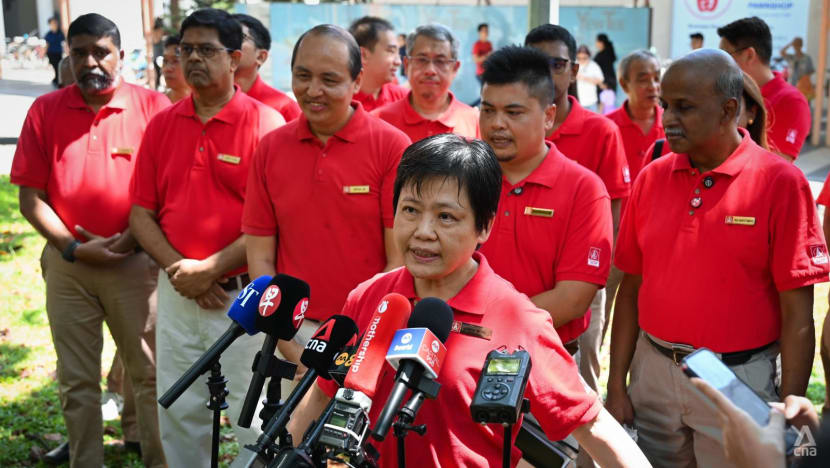
IMMIGRATION
"We believe that a government’s approach to population should focus on an immigration mechanism designed to attract and retain the best talents while preserving the obligation to provide citizens with a fair and equitable labour market," said the party.
Prof Tambyah added that the SDP was not against immigration but "unbridled immigration", which it said has contributed to overcrowding and pressure on jobs.
The party called for a talent track system to ensure that "only foreign professionals whose skills and credentials are rigorously verified" may work in Singapore.
Firms looking to hire foreign professionals should also be required to show that the skills they are seeking are not available within the "Singaporean candidate pool".
SDP said policies that "entrench ethnic and other differences" work against helping citizens and new immigrants feel a sense of belonging and loyalty.
It called for the Ethnic Integration Policy to be abolished, and the race identification on National Registration Identity Cards to be removed.
"Sensible immigration limits will allow Singaporean culture to strengthen and flourish, and facilitate the organic emergence of a Singapore Identity that new immigrants can take pride in being a part of," said the party.
CLIMATE
Under its climate policy, SDP’s key proposals include a moratorium on forest destruction and improved support for EV adoption, especially among taxis and buses.
It also proposed a stronger shift to renewable energy through innovation funding and higher fossil fuel taxes.
Prof Tambyah pointed out how there has been "concretisation of almost all the green spaces that we used to enjoy as kids in Singapore".
In turn, the personal well-being of residents will be affected when there are no more forests or green spaces, he added.
“Those of us who are going through this kind of environment, we know what it's like … to deal with heat and extreme climate.”
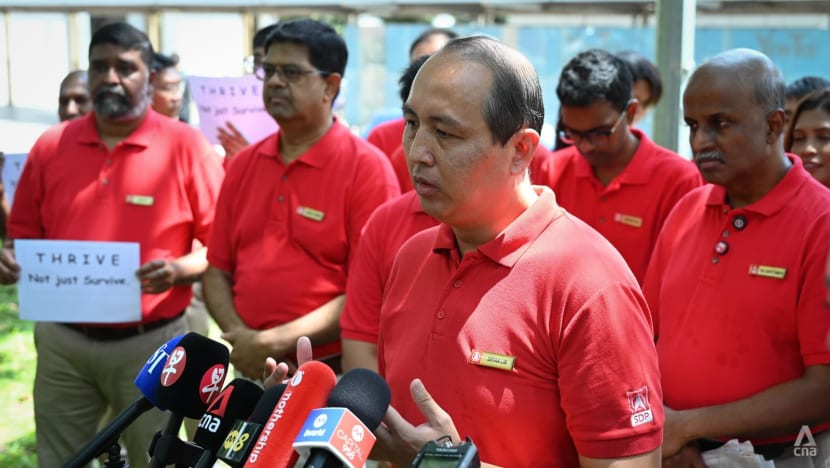
"NORTHERN STRATEGY"
SDP has said it would embark on a “northern strategy” for the upcoming General Election.
In recent weeks, it has unveiled its potential candidates in Sembawang and Marsiling-Yew Tee GRCs, as well as Sembawang West and Bukit Panjang Single Member Constituencies (SMCs).
Dr Chee will run in Sembawang West while Prof Tambyah is again contesting in Bukit Panjang.
"For years, SDP has had the reputation of being the party with the guts," said Prof Tambyah.
"They know if they vote us into parliament, they raise an issue ... and if the issue is relevant, we will not be afraid to ask that question, and I think that is something that many voters resonate with."
Nomination Day is on Wednesday, and Singaporeans will head to the polls on May 3.


















